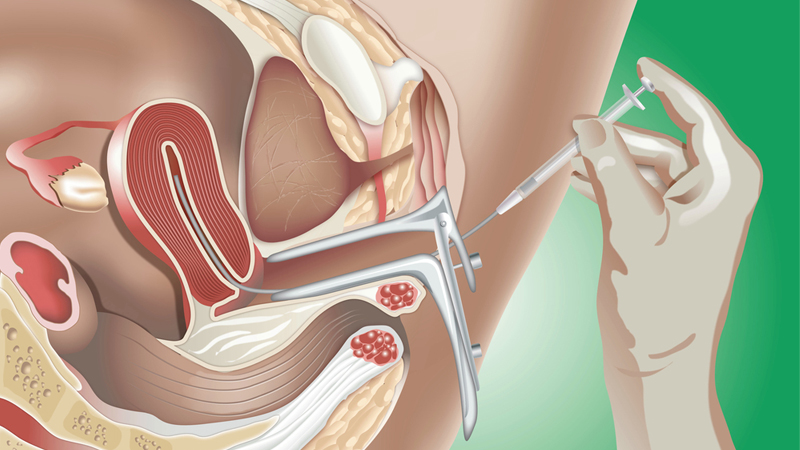Intrauterine insemination (IUI) is an easy procedure that puts sperm directly inside the uterus, which helps healthy sperm get closer to the egg. In some cases, couples may directly begin with IUI without progressing to IVF. In many cases, IUI may be the only treatment needed to achieve pregnancy.
How Exactly Does IUI Help Overcome Infertility?
IUI, or intrauterine insemination, is a simple fertility treatment. It can be done with or without fertility drugs. If not, then the male will submit the sample in the clinic through masturbation, this process is similar to the semen analysis done in IVF treatment. The sample will be frozen if the date of IUI is extended or even if it's on the next day. Usually, semen is collected on the day of IUI itself, it's only in some rare cases that it is collected one or more days before. Semen contains more than just one sperm so the doctor has to put semen in the semen washing process. This takes out the leaves and impurities only what’s needed for conception. Generally for IUI women has to undergo ovulation-stimulating drugs.
This medical procedure can be performed using the husband’s sperm or donor sperm. Before this procedure, the woman should be evaluated for any hormonal imbalance, infection or any structural problems. Insemination is performed at the time of ovulation, which is predicted by a urine test kit or blood test and ultrasound. In the case of ovulation-stimulation drugs, after 24-36 hours.
Success rates of IUI for women depend on the following:
- age
- underlying infertility diagnosis
- whether fertility drugs are used
- other underlying fertility concerns
Even the success rates of IUI are varied, the degree of variation depends upon the reason behind fertility treatment. As observed the success rates decrease in women over the age of 40. Women who couldn't be pregnant after three cycles of IUI, they should discuss it with the fertility specialist (if changed) before starting the procedure.
However, IUI is not recommended for:
- Women with severe disease of the fallopian tubes
- Women with a history of pelvic infections
- Women with moderate to severe endometriosis
For What Problems Can You Opt for IUI?
The procedure can be used for many kinds of fertility problems. In cases involving male infertility, it's often used when there's a very low sperm count or when sperm aren't strong enough to swim through the cervix and up into the fallopian tubes. For female infertility, it's sometimes if they have a condition called endometriosis or have anything abnormal in their reproductive organs. This method might also be right for them if they have unreceptive cervical mucus. (The mucus surrounds the cervix and prevents sperm from getting into the uterus and fallopian tubes. In IUI the sperms will skip the cervical mucus entirely.) Doctors even suggest IUI when they can't find the reason for infertility.
Are There Any Risks Associated With IUI?
The chances of twins, triplets or more are greater if a woman has taken fertility medications to increase the number of eggs. (Note: The chances of birth defects doesn't get increased in IUI). Possibility of birth defects in all children is 2% to 4% if conceived naturally or from IUI. There's a small risk of contracting an infection through IUI. In case of too many potential follicles, the cycle will surely be cancelled and tried again some other time. If the doctor cancels the cycle because of too many follicles then the couple will also have refrain from intercourse. (The instruction shall be taken seriously! However, if the couple has coitus and they conceive, they will put the future babies life in danger)
Some More Information You Might Want to Know About IUI
It may take multiple tries to achieve conception. For women younger than 35, there's a 10 to 20% chance of pregnancy after one round of intrauterine insemination. For women between the ages of 35 and 40, the odds are approximately 10%, and for women older than 40, there is approximately a 2 to 5% chance of pregnancy after one round of IUI. However, according to some fertility experts, the odds of getting pregnant with 3 to 6 cycles of IUI is as high as 80%.
Intrauterine insemination is a quite affordable fertility treatment, and many individuals or couples will try to choose IUI before moving forward with the more expensive and intensive IVF process. The benefits of IUI including the lower cost are lower time commitment with lower stress. So many couples tend to try IUI first. Since each person is different, the doctor will provide a different estimate of the expected success rate to different people. Contact a doctor for a better understanding of IUI/ fix an appointment if you are looking for one.



 IVF Centers
IVF Centers IVF Doctors
IVF Doctors Joint Replacement
Joint Replacement Spine Surgeries
Spine Surgeries Dental
Dental Slimming/Weight Loss Clinics
Slimming/Weight Loss Clinics Hair Transplant Clinics
Hair Transplant Clinics Physiotherapy clinics
Physiotherapy clinics
 Search
Search





